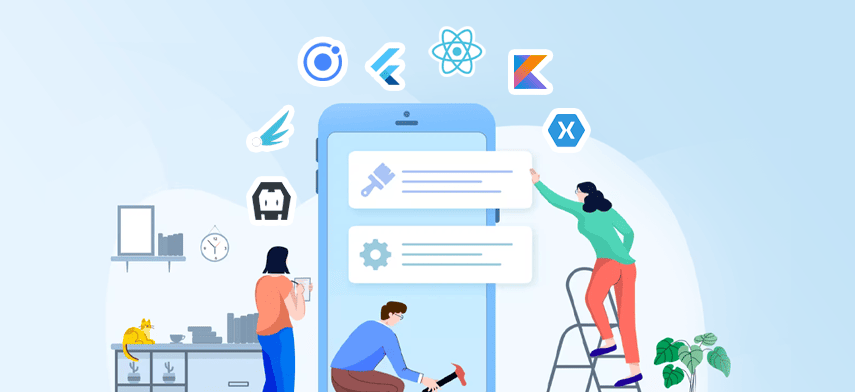As a business owner, it becomes really necessary to engage with the right audiences and address their requirements accordingly. One way to ensure this and move towards exponential growth is by developing mobile apps. But mobile app development is not an easy job. It requires the involvement of the right tools and software development kits (SDKs) to stay ahead of the curve. Mobile app development frameworks are one such imperative that can help you develop and engineer robust applications.

In today’s digital age, where wearable technology is becoming a norm and location-based devices are promoting automation, app development frameworks are playing a vital role in serving as the foundation.
But what do these app frameworks actually mean, and why should you invest your time in choosing the right one. Let’s take a look.
Defining App Development Framework
A mobile development framework is a comprehensive tool that developers use to create successful mobile applications. They offer your developers the needed access to a collection of code libraries, API tools, SDKs, etc., and help them build feature-rich apps without having to start from scratch. Another way to define these frameworks is a basic structure that helps you add more details to your code in accordance with custom code and offer a sustainable environment for custom mobile application development. These frameworks can be divided into three categories, as listed below:
1 Native Mobile App Development Framework
These frameworks are used to build native applications for a dedicated platform. They are typically designed to satisfy the requirements of a particular operating system (OS) that includes Windows, iOS, and Android.
2 Web App Development Framework
Simply known as a web framework, it is a software technology that helps programmers practice smooth web app development for web application programming interfaces (APIs), web servers, and web services.
3 Cross Platform App Development Framework
It is a hybrid mobile apps framework that can be used to develop cross platform applications. It possesses the abilities of both native and web development frameworks.
Along with the categories mentioned above, you also need to understand the following classification to define app frameworks in a better manner.
4 No Frameworks/High-level Programming Languages Approach
This approach offers next-level applicability, manageability, and flexibility to build successful applications. However, when it comes to developing enterprise apps, you can reinvent every facet, and the process gets prolonged.
5 Narrow-Focused Frameworks
This group is designed to streamline your mobile app development process with the help of enhanced abstraction and a painless API. When used correctly, such frameworks provide an even mix of speed and flexibility to your chosen development environment.
6 High-Level Full-Stack Frameworks
These frameworks enable you with a complete infrastructure to build full-fledged enterprise applications quickly and efficiently. Experts recommend it for developing custom software solutions, line of corporate apps, or enterprise resource planning (ERP) like systems.
7 Code Generators/Aggregators
This group plays a vital role in speeding up the initial phase of your app development. What gives it a competitive edge is its ability to configure your app based on Narrow-focused frameworks.
8 Low/No Code Frameworks
This framework requires you to practice small chunks of logic. If the integrations, user interface (UI) elements, performance, deployment choices, and more of such a framework are inclined to your anticipation, then this can lead to faster app development.
All these mobile development frameworks are essential as they can provide your developers with a quick, effective, and highly responsive app-building process. What makes them more important is that they amplify this process by offering an array of benefits such as less-to-no error atmosphere, code reusability, cost reduction, speedy time to market, etc. By using their debugging tools, pre-defined components, compilers, etc., you can definitely roll out an app that your users would love to interact with.
Best App Development Frameworks to Launch Successful Projects
Now, as you have come across all the basics of app frameworks and how they impact your overall software development lifecycle, let us check out some mobile app development frameworks that you can consider for your 2022 projects. The list is not limited to but includes the following.
1 Flutter
Flutter is a popular UI SDK that enables developers to design user-friendly applications for mobile, desktop, embedded, and web platforms. It lies among the most popular frontend frameworks that work on a single code base to develop hybrid iOS as well as Android apps. It’s an open-source development framework backed by customizable widgets, a 2D rendering engine (Skia), API testing, etc.
Key Features
- Hot reload.
- Native codes, third-party integrations, and platform APIs.
- Google Firebase support.
- Flexible UI.
Why Use it?
- It reduces code development time and offers a native-like user experience.
- Provides built-in material design and promotes fast app development.
- You can view real-time app performance and handle every function easily.
When to Use it?
- To develop applications for multiple screens.
- To build apps without using original equipment manufacturer (OEM) widgets or a lot of coding.
- To create customized, adaptive designs for your mobile apps.
Apps Built with Flutter
- Google Ads
- Cryptograph
- Xianyu by Alibaba
2 Kotlin Multiplatform Mobile (KMM)
It is an SDK that helps you develop cross-platform mobile apps in a hassle-free way. This multi-platform technology is based on a single code base that gives you the privilege to build high-end apps ready to work on both Android and iOS platforms. This means that you only have to write platform-specific code only for particular use cases like the implementation of a native UI.
Key Features
- KMM Plugin for Android Studio.
- Cocoapods integration.
- iOS device launching with Xcode 13.
- Kotlin/Native debugger type evaluation.
Why Use it?
- Supports other platforms like JavaScript, Linux, WebAssembly, etc.
- Has a strong and stable developer community.
- You can share code among all platforms (JS, JVM, etc.) used in your project and leverage all native capabilities.
When to Use it?
- For sharing code between mobile platforms.
- To design a connected app where the logic can be reused on both the server and the client-side.
- To make sure your app is free from various security risks and vulnerabilities.
Apps Built with KMM
- Space by Jetbrains
- VMware
- PlanGrid
3 Xamarin
It’s one of the leading cross platform app development frameworks based on .Net. Backed by Microsoft, this framework provides an open-source development environment with a powerful backend, components, API, and much more. Besides, Xamarin is supported by an array of programming languages, libraries, and tools to promote rapid app development.
Xamarin developers can help you develop native apps for iOS, Android, WatchOS, tvOS, Windows, and macOS.
Key Features
- Android SDK manager
- Google emulator manager
- Storyboard files
- Application loader
Why Use it?
- You can develop highly responsive applications that are easy to market.
- It has strong and active community support.
- It facilitates code reusability.
When to Use it?
- Experts recommend it for projects with custom UI, code sharing, business logic as their top priority.
- You can use it for applications with interactions that require native behavior.
- To write cross platform apps in C# via Visual Studio.
Apps Built with Xamarin
- Captio
- CA Mobile
- The World Bank
4 Swiftic
It’s an industry-acclaimed no-code app development framework to satisfy your iOS requirements. Its highly intuitive interface helps your developers create, manage, publish, and promote apps from a unified dashboard. Swiftic is the first DIY framework that creates a faster development environment to roll out customized software solutions.
Key Features
- Advanced analytics
- Third-party integrations
- Push notifications
- Loyalty cards
- In-app coupons
Why Use it?
- Premium tools and features to reach your target audience.
- Seamless communication approach.
- Social media integration.
- 30-day money-back guarantee.
When to Use it?
- To customize every aspect of your app’s appearance.
- To avoid starting from scratch and developing apps quickly and efficiently.
- To grow your sales outcomes exponentially.
Apps Built With Swfitic
- Remix Coffee Co.
- The Gentlemen’s Barber
- Spa Café
5 Native Script
It’s a comprehensive, open-source app development framework that is used to create powerful mobile/ web apps embedded with JavaScript/ TypeScript coding for both Android and iOS devices. Your developers can avoid the hassle of writing different code for web and mobile as they get the privilege to use the same code for both platforms.
Key Features
- Actionable plugins and customizations.
- Bundle workflow.
- Kendo Themes assistance and code sharing.
- AndroidX support.
Why Use it?
- It provides good support for VueJS and AngularJS frameworks.
- Native user experience combined with strong community support.
- Easy to learn as well as adopt and provides accessibility to Native APIs.
When to Use it?
- Recommended for cross platform applications.
- To offer comprehensive backend assistance.
- To reuse existing tools and code to develop quick prototype apps.
Apps Built With Native Script
- GreekyAnts
- Navadra
- Workbox
6 React Native
React Native stands amongst the most extensive mobile app development frameworks that are used by businesses across the globe. Embedded with JavaScript library code, these frameworks make app building for Android and iOS much easier. With React Native, you can successfully bridge the gap between your programmer’s efforts and native app performance.
Key Features
- Reusable components for optimal performance.
- Declarative API for predictive UI.
- Compatible third-party plugins.
- Low-code
Why Use it?
- Saves time, effort, and capital as your developers don’t have to build the same app for multiple platforms.
- React Native apps are easy to maintain. You can handle the code base seamlessly.
- There’s no need to learn complex languages like Objective-C and Java as React Native uses JavaScript Syntax Extension (JSX).
When to Use it?
- To develop cross platform applications that look and feel completely native.
- To transform your web page into an intuitive mobile app.
- To build apps faster and within budget.
Apps Built with React Native
- Tesla
- Airbnb
- Amazon Prime
7 Ionic
Another app framework that has gained popularity among the developer community is Ionic. It is an open-source AngularJS-based platform that helps create robust web, native, and hybrid applications utilizing CSS, JavaScript, and HTML technologies. Apps built with Ionic can be successfully published across multiple app stores and installed on all the available devices via Cordova or Capacitor.
Key Features
- Lazy Loading
- Ion-Ripple Effect
- Live reload to the browser/ emulator.
- Ion-Searchbar
Why Use it?
- It is a platform-independent framework that doesn’t require any change of code.
- Provides various customizable themes and components to create robust and simple designs.
- It makes mobile application testing much easier than its competitors.
When to Use it?
- You can use Ionic to develop dynamic and hybrid progressive web apps (PWAs) and cross platform apps.
- If your developers have prior experience in various JavaScript and Angular libraries, it would be a go-to platform.
- To build mobile applications without hiring native developers.
Apps Built with Ionic
- Diesel
- MarketWatch
- McLaren Automotive
8 Apache Cordova
Formerly known as PhoneGap, Apache Cordova is a famous technology platform that is used by programmers to develop mobile apps. It’s an open-source app development framework that uses HTML5, CSS3, and JavaScript technologies. Basically, this framework acts as a container that effectively aligns web apps with native mobile functionalities.
Key Features
- Command Line Interface (CLI).
- Third-party app management tools.
- Cordova core components.
- Cordova plugins.
Why Use it?
- To generate a faster software development process with a single codebase.
- Offers the needed flexibility to develop apps compatible with various platforms without learning new programming languages.
- The pre-defined plugins offer access to the device’s hardware components like GPS, camera, file system, accelerometer, etc.
When to Use it?
- To deploy web apps on multiple app stores.
- To combine native app components with WebView and access device-level APIs.
- When quick prototyping is the need of the hour.
Apps Built with Apache Cordova
- Untappd
- Localeur
- SparkChess
9 JQuery Mobile
This framework is also referred to as an HTML5-based UI system that programmers use to build highly responsive applications for desktops, tablets, and smartphones. It is one of the most favored mobile app development frameworks that offer customizable themes. Furthermore, it carries extensive support for Firefox, including Windows, Kindle, MacOS, and Blackberry.
Key Features
- Progressive enhancement and graceful degradation.
- Accessible Rich Internet Applications (ARIA).
- Theming and UI widgets.
- Uncomplicated API supporting user-friendly inputs.
Why Use it?
- Apps developed with JQuery Mobile support easy SEO optimization.
- Compatible with other frameworks like Apache Cordova.
- It’s light in weight and has good, straightforward API support.
When to Use it?
- To build exhaustive web pages.
- Highly recommended for developing different types of list views, buttons, form elements, toolbars, etc.
- When you want to create apps with UI enhancements that are accessible to all.
Apps Built with JQuery Mobile
- Slideshare
- Dodge
- Stanford
10 Framework7
Framework7 is an open-source development platform that assists software developers in creating future-ready web, desktop, and mobile applications that offer native experience. It brings in CSS, HTML, and some typical JavaScript which helps you start your project even with little knowledge about these technologies. It also offers VueJS and React components for app development.
Key Features
- Built-in grid system layout, FastClick library, and Helper libraries.
- High-performance and page animation.
- Clear JS API and flexible router API.
- Pre-styled widgets/components.
Why Use it?
- It provides a swift, responsive app development environment.
- Offers an enhanced ecosystem with templates, icons, and plugins.
- Can be easily integrated with other tools like NW.js and Electron.
When to Use it?
- To build hybrid web apps or mobile applications for iOS and Android devices.
- When faster loading time is what you seek.
- When you want a prototyping tool to readily monitor the working app prototype.
Apps Built with Framework7
- My Shopper
- GoDial
- PricePoint
11 Express JS
Simply known as Express, this is a NodeJS-based framework that brings the best web/mobile applications and RESTful APIs to your table. It is amongst the most popular backend frameworks that can be referred to as an upper layer of NodeJS that helps your programmers to manage routes and servers.
Key Features
- Highly advanced routing mechanism.
- Templating engines.
- Dedicated debugging mechanism.
- Flexible middleware module.
Why Use it?
- Offers faster Input/Output ( I/O) capabilities.
- It’s asynchronous and single-threaded
- Routing becomes easier with a robust API.
- It’s introduced as a free and open-source platform under the MIT License.
When to Use it?
- To create single-page, hybrid, and multi-page web/mobile apps.
- When you want to write apps in a modular, fast and secure development environment.
- To develop server-side web apps quickly.
Apps Built with ExpressJS
- Netflix
- Uber

App Development Framework – Key Factors to Consider
Various factors influence an organization’s decision to choose one development framework over another. As a business owner, you need to consider these factors to understand which framework is best for your project. So, let’s discuss them one by one.
1 Platform Feature Support
Today, most running mobile applications are cross platform. They are designed to satisfy the requirements of various platforms without having to recode for a specific native ecosystem. This approach helps businesses spend less time coding for particular platforms and helps users access mobile apps on multiple platforms that they own. Besides, this approach also enables seamless data integration between systems.
2 Speed Considerations
Be it cross platform or native mobile apps, their performance and functionalities should reflect the speed at every point. This becomes more crucial for gaming apps where speed is of utmost importance. As such, mobile app development frameworks that can help your programmers utilize the best libraries and code for optimal performance should be taken into consideration.
3 Development Cost
When you strategize app development for web, mobile, desktop platforms, and devices, having a crystal clear idea of the development cost with respect to the expected ROI is an important factor to consider. At the same time, you also need to evaluate the budget required to choose a particular framework(s). Therefore, you need to define the outcomes you expect while deploying your app with your chosen framework, thereby determining the ROI.
4 Security Risks
In today’s digital age, the growing data breaches mostly target the combination of cellular networks, software, and Wi-Fi security used by mobile apps. Apart from adhering to legislation like GDPR, HIPAA, and CCPA, certain apps also need a risk-free payment gateway or system to offer secure transactions at all times. As such, bringing an app framework onboard that safeguards this environment is of great significance.
5 Elevate Efficiency
Choosing the best framework for mobile apps and operating within the scope of the thin coding pattern that your developers are well-aware of can help you develop a successful app. Besides, selecting a framework that augments your developers’ expertise and experience alongside making no compromises on delivering a top-notch quality product shall prove profitable in the long run.
6 After Launch Updates
One of the most important factors while picking a development framework for your app-building process is the future impact. You need to choose a framework that boosts your upcoming processes and basic/advanced maintenance operations after the successful deployment. These processes should include app support, bug fixes, and upgrades/updates, to name a few.
Wrapping Up
Selecting the right one out of all the mobile app development frameworks available across the market itself is a key step to observing a smooth mobile app development process. Understanding your end goals and what you want to achieve with your selection will help you generate profitable outcomes. You can also hire mobile app developers from Mobisoft that have years of experience in designing result-oriented apps and can help you choose a framework that perfectly suits your unique business needs.

Author's Bio:

Pritam Barhate, with an experience of 14+ years in technology, heads Technology Innovation at Mobisoft Infotech. He has a rich experience in design and development. He has been a consultant for a variety of industries and startups. At Mobisoft Infotech, he primarily focuses on technology resources and develops the most advanced solutions.


